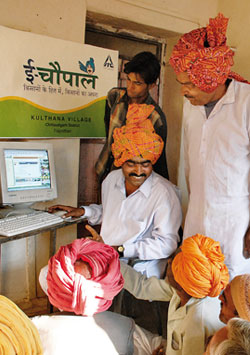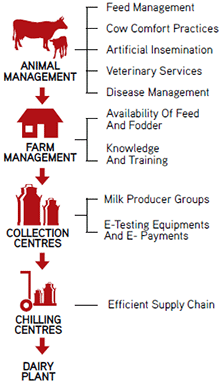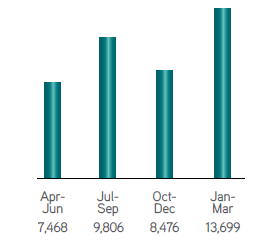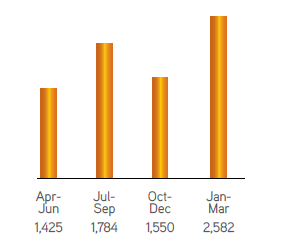Social Performance
Social - Mission Sunehra Kal
ITC e-Choupal
The transparency and effectiveness of the ITC e-Choupal system has led to the enhancement of rural incomes, whilst ensuring sustainable agri-sourcing for ITC’s businesses
 Recognising the various challenges faced by the farmer and leveraging ITC’s consumer facing businesses, ITC e-Choupal was designed to provide a 360-degree intervention to trigger a virtuous cycle of higher farm productivity, higher income, enlarged capacity for farmer risk management, and thereby larger investments to enable higher quality and productivity. In a pioneering move, the power of Information Technology and the Internet was utilised to empower small and marginal farmers by setting up Internet kiosks, which made available a host of services related to know how, best practices, timely and relevant weather information, transparent discovery of prices and others. The kiosks were managed by trained farmers (sanchalaks) who helped the agricultural community access ready information in their local language. The e-Choupal network also provides customised extension services and training through Choupal Pradarshan Khets (demonstration farms). Farmers have also been empowered with the establishment of integrated rural services hubs called Choupal Sagaars. The transparency and effectiveness of the ITC e-Choupal system has led to the enhancement of rural incomes, whilst ensuring sustainable agri-sourcing for ITC’s businesses. By providing know how and connecting farmers to markets, the e-Choupal enabled a virtual integration of the supply chain and eliminated wasteful intermediation and multiple handling, which led to significant reduction in transaction costs apart from expanding markets and enhancing rural incomes. This initiative has benefitted over 4 million farmers in 40,000 villages.
Recognising the various challenges faced by the farmer and leveraging ITC’s consumer facing businesses, ITC e-Choupal was designed to provide a 360-degree intervention to trigger a virtuous cycle of higher farm productivity, higher income, enlarged capacity for farmer risk management, and thereby larger investments to enable higher quality and productivity. In a pioneering move, the power of Information Technology and the Internet was utilised to empower small and marginal farmers by setting up Internet kiosks, which made available a host of services related to know how, best practices, timely and relevant weather information, transparent discovery of prices and others. The kiosks were managed by trained farmers (sanchalaks) who helped the agricultural community access ready information in their local language. The e-Choupal network also provides customised extension services and training through Choupal Pradarshan Khets (demonstration farms). Farmers have also been empowered with the establishment of integrated rural services hubs called Choupal Sagaars. The transparency and effectiveness of the ITC e-Choupal system has led to the enhancement of rural incomes, whilst ensuring sustainable agri-sourcing for ITC’s businesses. By providing know how and connecting farmers to markets, the e-Choupal enabled a virtual integration of the supply chain and eliminated wasteful intermediation and multiple handling, which led to significant reduction in transaction costs apart from expanding markets and enhancing rural incomes. This initiative has benefitted over 4 million farmers in 40,000 villages.
Social Investments Programme - Coverage
The projects promoted under the Social Investments programme increased from 101 in 2011-12 to 107 during the reporting period. These projects are spread across 10 states covering 60 districts. The interventions reach out to more than 6 lakh households in more than 6,500 villages. Of the total projects currently being implemented, 76% are targeted at the Company’s rural stakeholder households, while the balance 24% addresses stakeholders residing around our factories. The Social Investments programme is spread across the states of Andhra Pradesh, Bihar, Karnataka, Kerala, Madhya Pradesh, Maharashtra, Rajasthan, Tamil Nadu, Uttar Pradesh and West Bengal.
Animal Husbandry and Dairy Development
The programme for genetic improvement of cattle through artificial insemination to produce high-yielding crossbred progenies has been given special emphasis because it reaches out to the most impoverished and has the potential to enable them live with social and economic dignity. Ten new Cattle Development Centres (CDCs) were established during the year, taking the total to 303 centres covering nearly 5,000 villages, that facilitated 2.75 lakh artificial inseminations during the year.
Taking the next step in the development of a viable livestock economy, ITC focused on dairy development in Munger this year. Some of the key highlights include:
| ACTIVITY |
2011-12 |
2012-13 |
CUM TO 2012-13 |
| CDC Centres (No) |
83 |
10 |
303 |
| Breed Improvement |
|
|
|
| No of Ais (lakhs) |
2.32 |
2.75 |
10.82 |
| No of Pregnancies (lakhs) |
1.02 |
1.30 |
4.84 |
| No of Calfing (lakhs) |
0.67 |
0.89 |
3.08 |
| Vaccination & Health (lakhs) |
1.04 |
0.72 |
4.89 |
1. Project Gomukh
Integrated Dairy Management Programme

A pilot project was launched in Munger to cater to the need for veterinary services and provide comprehensive techno-management support to dairy farmers.
The implementation of this project started in August 2012 with the establishment of a Pashudhan Sewa Kendra (PSK) to provide integrated animal husbandry services. PSK delivers a comprehensive package of extension services, such as veterinary care, breeding, supply of balanced concentrate of cattle feed and feed supplements, fodder propagation and training to dairy farmers through experts. A call centre was set up to enable farmers register their requests. The success of this pilot is evident from the rapid growth in all services that are being offered.
Project Gomukh aims at creating centres of excellence in clusters of villages (hubs) by providing customised end-to-end solutions for dairy farms and milch animals. The overarching objective of the project is to increase milk productivity and improve the quality of milk, thereby increasing farm incomes significantly. These will be achieved through an integrated package of services that includes:
Best-in-class animal and calf management practices
Hygienic milking and milk handling
Efficient feeding process
Cow comfort practices
Veterinary and preventive health care services
Efficient green fodder and manure management
2. Milk Procurement
A total of 87 MPGs with over 2,843 members were functional during the year for the promotion of improved yields and higher procurement. The average daily procurement in Munger was 9,862 kg per day with a peak of over 17,000 kg.
Average Daily Procurement, 2012-13 (litres/day)

Average Number Of Farmers/Day

3. Other Locations
Dairy development in Saharanpur commenced during the year. Two hubs have been set up for initiating activities. A call centre was established in December for providing artificial insemination and extension services. Comprehensive milk mapping studies have been completed at two other locations to enable planning for the expansion of dairy-led CSR.
Social Performance
Social - Mission Sunehra Kal
ITC e-Choupal
Social Investments Programme - Coverage
The projects promoted under the Social Investments programme increased from 101 in 2011-12 to 107 during the reporting period. These projects are spread across 10 states covering 60 districts. The interventions reach out to more than 6 lakh households in more than 6,500 villages. Of the total projects currently being implemented, 76% are targeted at the Company’s rural stakeholder households, while the balance 24% addresses stakeholders residing around our factories. The Social Investments programme is spread across the states of Andhra Pradesh, Bihar, Karnataka, Kerala, Madhya Pradesh, Maharashtra, Rajasthan, Tamil Nadu, Uttar Pradesh and West Bengal.
Animal Husbandry and Dairy Development
The programme for genetic improvement of cattle through artificial insemination to produce high-yielding crossbred progenies has been given special emphasis because it reaches out to the most impoverished and has the potential to enable them live with social and economic dignity. Ten new Cattle Development Centres (CDCs) were established during the year, taking the total to 303 centres covering nearly 5,000 villages, that facilitated 2.75 lakh artificial inseminations during the year.
Taking the next step in the development of a viable livestock economy, ITC focused on dairy development in Munger this year. Some of the key highlights include:
1. Project Gomukh
Integrated Dairy Management Programme
A pilot project was launched in Munger to cater to the need for veterinary services and provide comprehensive techno-management support to dairy farmers.
The implementation of this project started in August 2012 with the establishment of a Pashudhan Sewa Kendra (PSK) to provide integrated animal husbandry services. PSK delivers a comprehensive package of extension services, such as veterinary care, breeding, supply of balanced concentrate of cattle feed and feed supplements, fodder propagation and training to dairy farmers through experts. A call centre was set up to enable farmers register their requests. The success of this pilot is evident from the rapid growth in all services that are being offered.
Project Gomukh aims at creating centres of excellence in clusters of villages (hubs) by providing customised end-to-end solutions for dairy farms and milch animals. The overarching objective of the project is to increase milk productivity and improve the quality of milk, thereby increasing farm incomes significantly. These will be achieved through an integrated package of services that includes:
Best-in-class animal and calf management practices
Hygienic milking and milk handling
Efficient feeding process
Cow comfort practices
Veterinary and preventive health care services
Efficient green fodder and manure management
2. Milk Procurement
A total of 87 MPGs with over 2,843 members were functional during the year for the promotion of improved yields and higher procurement. The average daily procurement in Munger was 9,862 kg per day with a peak of over 17,000 kg.
Average Daily Procurement, 2012-13 (litres/day)
Average Number Of Farmers/Day
3. Other Locations
Dairy development in Saharanpur commenced during the year. Two hubs have been set up for initiating activities. A call centre was established in December for providing artificial insemination and extension services. Comprehensive milk mapping studies have been completed at two other locations to enable planning for the expansion of dairy-led CSR.